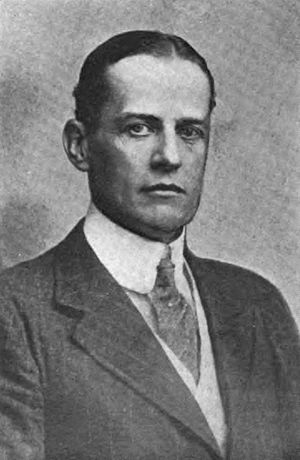W. B. Maxwell facts for kids
Quick facts for kids
William Babington Maxwell
|
|
|---|---|

W.B. Maxwell, The Bookman
|
|
| Born | 1866 Richmond, England
|
| Occupation | Novelist and playwright |
| Years active | 1880s–1938 |
| Spouse(s) |
Sydney Constance Brabazon
(m. 1906–1938) |
| Children | Henry Maxwell |
| Relatives | Mary Elizabeth Braddon John Maxwell (1824–1895) Fanny Margaret Maxwell (1863–1955) |
William Babington Maxwell (1866–1938) was a British writer who wrote many novels and plays. He was known for his interesting stories and his service in the First World War.
Growing Up
William Babington Maxwell was born on June 4, 1866. His mother was the famous novelist Mary Elizabeth Braddon. His father was John Maxwell, an Irish businessman.
His family lived in a place called Lichfield House in Richmond, England. They often spent their holidays in the beautiful New Forest. William stopped going to school when he was 14 years old. This was because his mother worried about him studying too much.
His Writing Career
William Maxwell first trained to be an artist. But he later decided to become a writer instead. He started writing short stories to help him feel better when he was sad.
His very first story was printed in a newspaper called The World. He earned £5 for it, which was a good amount of money back then. He also wrote stories for other magazines like Truth and Temple Bar.
When he became an adult, his father gave him control of a magazine called Mistletoe Bough. William tried hard to make it successful, but it didn't work out.
He also wrote plays for the theater. One of his plays was called The Last Man In. It was shown in Glasgow in 1910. He also wrote a funny play called The Naked Truth with another writer, Emily Morse Symonds. This play was first shown in London in 1910.
In 1913, William wrote a novel called The Devil's Garden. This book was not allowed in libraries by the Libraries Association. William was also a friend of King Edward VII, who he thought was a very important person.
Serving in World War I
Even though he was almost 50 years old when the First World War started, William Maxwell wanted to help. He joined the Royal Fusiliers as a lieutenant. He served in France during the war until 1917.
His military journey began in London. He was given the job of finding 1,000 new soldiers. He did even better and found 1,300 men! The group of soldiers he helped create went to Colchester for training.
William was in charge of the money for the soldiers' food and supplies. He wrote down lists of food and supplies for soldiers and animals in his notebook in 1916. He was promoted to Lieutenant on September 3, 1914.
After training in Colchester, he moved to other places like Andover and Salisbury Plain. In 1915, he was sent to the front lines of the war. In his book Time Gathered, he wrote about being a Regimental Transport Officer. This meant he moved soldiers, equipment, bombs, and machine guns to the front. He also made sure food and water got to them.
He was stationed near the front line at a place called Berles-Aux-Bois. He even fought in the famous Battle of the Somme.
Later, William was promoted to Honorary Captain for his service. He then moved to a place called Mametz Wood, which he called 'Death Valley'. One time, while moving equipment, a bomb pile exploded near him. Luckily, he was not hurt at all. He said he didn't even get a scratch on his uniform.
Another time, he was in the trenches with his commanding officer. A shell hit the trench, and they both fell to the ground. William thought he had a hole in his back, but he was safe again.
In 1917, William's time in the army ended. His commander and friend, Reggie Barnes, told him to go home because he was worried about William's health. Barnes thought William would not survive another winter fighting. In 1918, William officially left the army. He served from August 1914 to 1917, without going home for a break.
Later Life and Legacy
After the war, William Maxwell became the chairman of the Society of Authors until 1928. He also became the chairman of the National Book Council. He had strong opinions about new writers. He believed they didn't understand people's feelings very well.
William liked to gather many details for his stories. He was very interested in how people lived and worked in English shops, especially girls in towns.
William Maxwell became sick during a meeting for the Royal Literary Fund. He passed away three weeks later at his home in London on August 4, 1938.
 | Isaac Myers |
 | D. Hamilton Jackson |
 | A. Philip Randolph |

